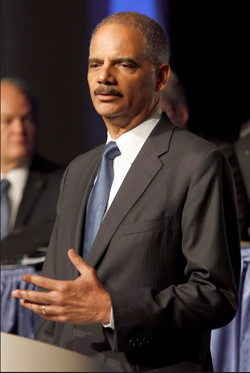Sweeping reversal of the War on Drugs announced by Atty General Holder

Eric Holder speaks at the 2013 ABA Annual
Meeting. Photo by Tony Avelar.
U.S. Attorney General Eric Holder, speaking to the ABA’s 560-member policy making House of Delegates, on Monday announced a sweeping initiative by the Justice Department that in effect renounces several decades of tough-on-crime anti-drug legislation and policies.
Significantly, among initiatives Holder outlined today, Holder announced a change in DOJ policies for dealing with low-level, non-violent drug offenders, with an eye to ending over-incarceration and its counter-productive effects on society, largely because of mandatory minimum sentences.
“Too many Americans go to too many prisons for far too long and for no truly good law enforcement reason,” Holder said, receiving applause from the lawyers.
Holder’s short-notice, high-profile announcement added extra buzz on the House of Delegates’ opening session in the Moscone Center at the ABA Annual Meeting in San Francisco.
The new “Smart on Crime” program will encourage U.S. attorneys to charge defendants only with crimes “for which the accompanying sentences are better suited to their individual conduct, rather than excessive prison terms more appropriate for violent criminals or drug kingpins,” said Holder.
Video of Holder’s speech via ABANow.org
Holder has told U.S. attorneys to “develop specific, locally tailored guidelines–consistent with our national priorities–for determining when federal charges should be filed, and when they should not.”
The Smart on Crime effort is limited to the DOJ’s policy parameters. Holder said President Obama is asking Congress to pass legislation to give federal judges greater discretion with mandatory minimum sentencing for some drug offenses, among other proposals.
Holder pointed out that senators Dick Durbin (D-Il.), Mike Lee (R-Utah), Patrick Leahy (D-Vt.) and Rand Paul (R-Ky) are supporting such efforts. They include the proposed Smarter Sentencing Act of 2013, which would lower several drug-crime mandatory minimum sentences, as well as give federal judges leeway to give sentences that are less than called for under sentencing guidelines.
For years, the ABA has been calling these and other reforms to criminal laws.
“The attorney general’s announcement is a welcome and much-needed response to serious problems of over-criminalization and over-incarceration,” says Neal Sonnett, past chair of the ABA Criminal Justice Section.
“We have learned a lot since the widespread enactment of draconian, one-size-fits-all mandatory minimum sentencing laws in the 1980s,” ABA President Laurel G. Bellows said in response to Holder’s announcement. “The level of incarceration and the fiscal and human costs under current federal policies are unsustainable. Already, the growth in the budget for the Federal Bureau of Prisons is crowding out and resulting in the elimination of vital law-enforcement programs. These changes outlined by Attorney General Holder today are welcome and much-needed steps toward bringing the federal system into line with smart, evidence-based policy that will better serve taxpayers and public safety.”
The increasing economic burden of over-incarceration was a thread running through Holder’s statements on fairness and justice.
“It makes plain economic sense,” he said, and called on the ABA as a “driver of positive change” to help in the efforts. The association has a number of policies that track several of the DOJ’s new efforts.
In recent years, the DOJ telegraphed the possibility of Holder’s bold move. In February 2012, for example, when Associate Deputy Attorney General Matthew Axelrod, in testimony before the U.S. Sentencing Commission, said that “we are now on a funding trajectory that will result in more federal money spent on imprisonment and less on police, investigators, prosecutors, re-entry and crime prevention,” adding that “in these budget times, maximizing public safety can only be achieved if we control prison spending.”
The DOJ’s new initiative announced today includes not just lowering the financial burden of imprisonment, but better funded and focused efforts at law enforcement, as well as programs for treatment and rehabilitation of low-level, non-violent offenders.
Holder said that in 2010, $80 billion went toward incarceration and that prisons are filled 40-percent beyond capacity. Mandatory minimum sentences are partly responsible for those costs and numbers.
Bipartisan support in blue states and red states has led to significant reforms, Holder said, and in turn their prison populations have declined.
The possibility of significant legislative changes in sentencing and incarceration policies got a boost in 2010 when a group of prominent conservatives with tough-on-crime bona fides signed on to a statement of principles supporting such reforms. That document is the backbone of the Right on Crime coalition launched that year, seeking to rework criminal justice policy in part because besides harms to society, tight government budgets have made over-incarceration simply too expensive.
The statement of principles signatories include former attorney general Ed Meese, former drug czar Bill Bennett, Newt Gingrich, conservative movement godfather Richard Viguerie and Grover Norquist, the no-tax-increase guru. It can provide cover to legislators who want to support reform but fear being tagged “soft on crime.”
“I used to call Ed Meese or Bill Bennett or some others, time after time, to get them to call individual legislators in support of bills, but now we can just point to the statement of principles and the names behind it,” Pat Nolan, who developed the document, told the Journal last year.
He had been the Republican leader in the California State Assembly until he was caught accepting illegal campaign contributions. He went to prison in the mid-1990s, where he would follow Colson’s faith-based, redemptive path. Nolan developed the list of big-name conservatives, and he is on it.
“The legislators see they’re not alone and supporting oddball aberrations, but are part of the mainstream conservative movement.”
See also:
Holder’s prepared remarks (PDF)
Washington Post: “Holder seeks to avert mandatory minimum sentences for some low-level drug offenders”
The New York Times: “Justice Department Seeks to Curtail Stiff Drug Sentences”
Updated at 5:24 p.m. to state that there are 560 members of the House of Delegates.



